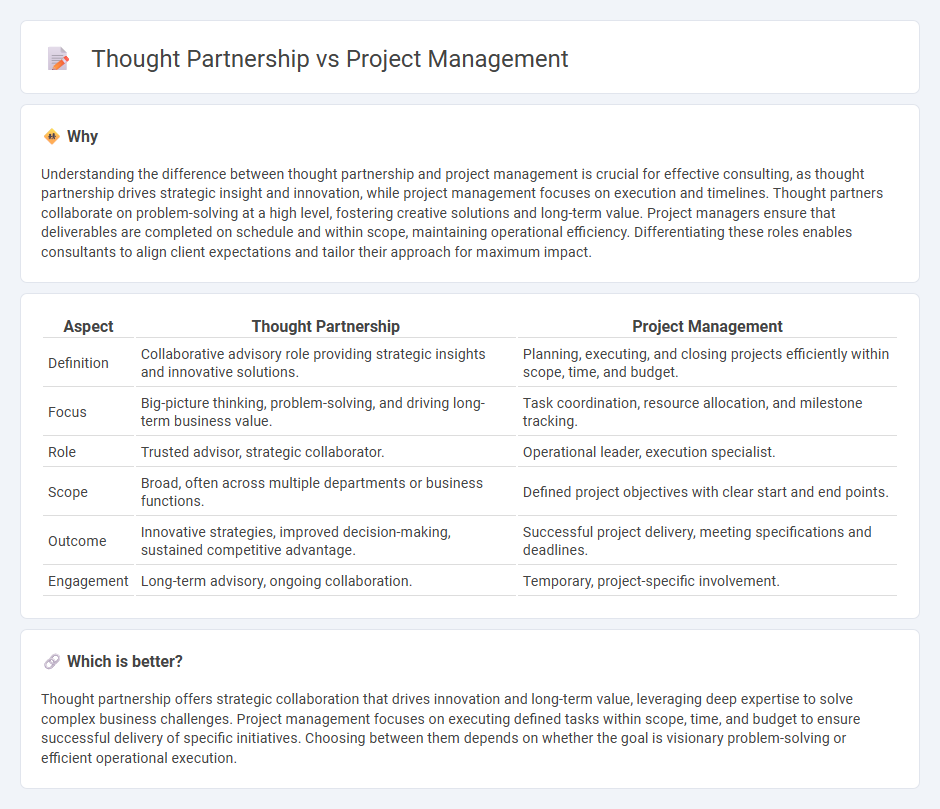
Thought partnership emphasizes strategic collaboration and deep insight exchange to drive innovative solutions, contrasting with project management's focus on planning, executing, and delivering specific outcomes within defined timelines. Consulting firms often integrate both approaches to maximize client value by blending visionary thinking with disciplined execution. Explore the distinctions and synergies between thought partnership and project management to elevate your consulting strategy.
Why it is important
Understanding the difference between thought partnership and project management is crucial for effective consulting, as thought partnership drives strategic insight and innovation, while project management focuses on execution and timelines. Thought partners collaborate on problem-solving at a high level, fostering creative solutions and long-term value. Project managers ensure that deliverables are completed on schedule and within scope, maintaining operational efficiency. Differentiating these roles enables consultants to align client expectations and tailor their approach for maximum impact.
Comparison Table
| Aspect | Thought Partnership | Project Management |
|---|---|---|
| Definition | Collaborative advisory role providing strategic insights and innovative solutions. | Planning, executing, and closing projects efficiently within scope, time, and budget. |
| Focus | Big-picture thinking, problem-solving, and driving long-term business value. | Task coordination, resource allocation, and milestone tracking. |
| Role | Trusted advisor, strategic collaborator. | Operational leader, execution specialist. |
| Scope | Broad, often across multiple departments or business functions. | Defined project objectives with clear start and end points. |
| Outcome | Innovative strategies, improved decision-making, sustained competitive advantage. | Successful project delivery, meeting specifications and deadlines. |
| Engagement | Long-term advisory, ongoing collaboration. | Temporary, project-specific involvement. |
Which is better?
Thought partnership offers strategic collaboration that drives innovation and long-term value, leveraging deep expertise to solve complex business challenges. Project management focuses on executing defined tasks within scope, time, and budget to ensure successful delivery of specific initiatives. Choosing between them depends on whether the goal is visionary problem-solving or efficient operational execution.
Connection
Thought partnership enhances project management by fostering strategic collaboration, enabling clearer goal setting, and improving decision-making processes throughout project execution. Integrating thought partnership within project management frameworks increases adaptability and responsiveness to client needs, driving successful project outcomes. Effective communication and continuous idea exchange in thought partnerships ensure alignment and accountability among stakeholders during project lifecycles.
Key Terms
**Project Management:**
Project management involves the systematic planning, execution, and monitoring of tasks to achieve specific goals within scope, time, and budget constraints. Key components include resource allocation, risk management, and milestone tracking to ensure project deliverables meet quality standards. Discover how effective project management drives organizational success by optimizing processes and enhancing team collaboration.
Timeline
Project management centers on creating and adhering to detailed timelines to ensure task completion within set deadlines. Thought partnership emphasizes collaborative brainstorming and strategic input, often influencing timeline adjustments for improved outcomes. Explore how integrating both approaches can optimize your project's timeline and success.
Deliverables
Project management emphasizes defining, planning, and tracking deliverables to ensure timely completion within scope and budget. Thought partnership contributes strategic insights and collaborative problem-solving to enhance the quality and impact of deliverables. Explore how integrating both approaches can optimize project outcomes and drive success.
Source and External Links
Why Is Project Management Important? | National University - Project management ensures projects are completed on time, within budget, and meet quality expectations by aligning objectives, defining roles, and maintaining clear communication among team members.
What is Project Management? The Complete Guide [2025] - Project management is the practice of planning and managing projects from start to finish, involving five key phases: initiating, planning, executing, monitoring, and closing to ensure project goals are achieved efficiently.
What is project management? | APM - Project management is the application of processes, methods, skills, knowledge, and experience to achieve specific project objectives within a finite timeline and budget, distinct from ongoing management.
 dowidth.com
dowidth.com